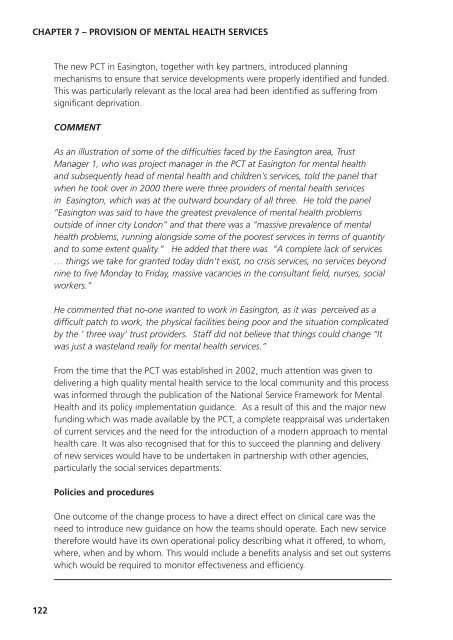Lousia Ovington independent investigation report ... - NHS North East
Lousia Ovington independent investigation report ... - NHS North East
Lousia Ovington independent investigation report ... - NHS North East
Create successful ePaper yourself
Turn your PDF publications into a flip-book with our unique Google optimized e-Paper software.
CHAPTER 7 – PROVISION OF MENTAL HEALTH SERVICES<br />
122<br />
The new PCT in Easington, together with key partners, introduced planning<br />
mechanisms to ensure that service developments were properly identified and funded.<br />
This was particularly relevant as the local area had been identified as suffering from<br />
significant deprivation.<br />
COMMENT<br />
As an illustration of some of the difficulties faced by the Easington area, Trust<br />
Manager 1, who was project manager in the PCT at Easington for mental health<br />
and subsequently head of mental health and children’s services, told the panel that<br />
when he took over in 2000 there were three providers of mental health services<br />
in Easington, which was at the outward boundary of all three. He told the panel<br />
“Easington was said to have the greatest prevalence of mental health problems<br />
outside of inner city London” and that there was a “massive prevalence of mental<br />
health problems, running alongside some of the poorest services in terms of quantity<br />
and to some extent quality.” He added that there was “A complete lack of services<br />
… things we take for granted today didn’t exist, no crisis services, no services beyond<br />
nine to five Monday to Friday, massive vacancies in the consultant field, nurses, social<br />
workers.”<br />
He commented that no-one wanted to work in Easington, as it was perceived as a<br />
difficult patch to work, the physical facilities being poor and the situation complicated<br />
by the ‘ three way’ trust providers. Staff did not believe that things could change “It<br />
was just a wasteland really for mental health services.”<br />
From the time that the PCT was established in 2002, much attention was given to<br />
delivering a high quality mental health service to the local community and this process<br />
was informed through the publication of the National Service Framework for Mental<br />
Health and its policy implementation guidance. As a result of this and the major new<br />
funding which was made available by the PCT, a complete reappraisal was undertaken<br />
of current services and the need for the introduction of a modern approach to mental<br />
health care. It was also recognised that for this to succeed the planning and delivery<br />
of new services would have to be undertaken in partnership with other agencies,<br />
particularly the social services departments.<br />
Policies and procedures<br />
One outcome of the change process to have a direct effect on clinical care was the<br />
need to introduce new guidance on how the teams should operate. Each new service<br />
therefore would have its own operational policy describing what it offered, to whom,<br />
where, when and by whom. This would include a benefits analysis and set out systems<br />
which would be required to monitor effectiveness and efficiency.
















